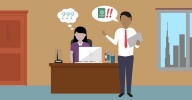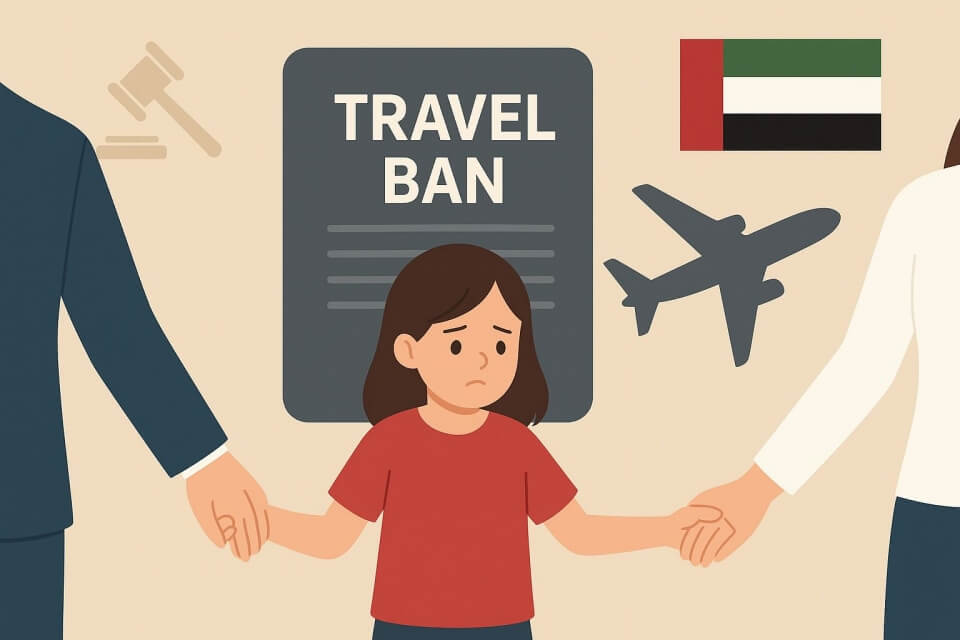المدونة القانونية
What to Consider when you are Planning to Leave the UAE

Tim Elliot: Welcome to Lawgical, the UAE’s first legal podcast. It’s also still the UAE’s only legal podcast as well. I’m Tim Elliot. I’m talking once again to the Managing Partner of the Dubai-based law firm, HPL Yamalova & Plewka. Here is Ludmila Yamalova. Good to be back.
Ludmila Yamalova: Good to have you back. Thanks for coming.
Tim Elliot: Nice to see you. Now today on Lawgical, what people should think about when they’re planning to leave the UAE. Now lots of people make the UAE their home. We have. We’re both here as expatriates and there will come a time when we decide to leave. One of the things you learn as you get older is that time goes by, and it seems to speed up as you age. I don’t know if you feel the same way, but I certainly feel that. That time is coming and coming sooner than I think. We will be leaving the UAE at some point. What do you need to do before you do leave? Can we start with bank accounts?
Ludmila Yamalova: Sure. There is a whole list of things that you should go through and be sure that you cross all the items on the list before you leave the country.
Tim Elliot: Right.
Ludmila Yamalova: Bank account - and anything to do with banks - is absolutely one of the more crucial ones. However, I would say anything to do with banking or not anything, but the final closure of the bank account perhaps could be left to later, and this is because of a number of things that may ultimately require you to have a current bank account. For example, let’s say you own property and you live in that property. Now you want to sell the property because you are leaving the country. Where will you want that money to be deposited? You need to have a bank account for that.
Or let’s say you’re terminating, obviously, since you’re leaving, your employment is being terminated and you now you have the end of service coming your way or last salary. Once again, where will that be paid to? Also, anything to do with any kind of other loans that you may have that you are still paying before your final day. In many cases, you actually, in practical terms, need to have a bank account available to you until much later. Furthermore, I will tell you that we have seen a number of people, especially if you’ve lived here for a long enough time, who, even though they leave the country, perhaps still have some investments left behind.
For example, somebody might still have property that they wish to keep, and they just rent it out. Therefore, you will need to have a bank account, for example, to receive rental payments. Even more so, a lot of people these days actually, if they have a choice, would prefer to have a bank account even when they leave, for whatever other reasons they may have. Perhaps it is just another option for them to keep. Bank accounts, yes, if you are completely, completely leaving the country at some point the time will come where you must make sure that you close the bank account completely, but in many cases in practical terms, you need to have it until a number of other items on the list have been crossed off.
Tim Elliot: Okay. So you can have a bank account open here if you don’t live here. You shouldn’t necessarily do that first. What should you do first then, if you’re about to leave the Emirates?
Ludmila Yamalova: It depends on your situation and connections to the country. For example, if you’re employed, one of the things you do is that you notify the company that you are resigning or obviously if your decision to leave the country stems from the fact that your employment has been terminated, irrespective of the reason that’s an important element of your life that you need to sort out early on. Let’s say if you are being terminated, then you need to agree with your employer as to what your end-of-service compensation will be, and there are a lot of cases often where parties don’t agree right away and those cases last past even people leaving the country.
Because it can be fairly complicated, that is one of the first elements that you at least want to start addressing. If you have an agreement with your employer, then you just need to make sure that you’ve agreed as to (1) where that final payment and settlement goes to, and (2) a very important factor that relates to employment is your visa and your residency. If you are the breadwinner in the family and the rest of the family was sponsored by you, that would be by virtue of you being sponsored by your company.
If your employment comes to an end, therefore, you need to cancel your visa and before you cancel your visa, you will need to cancel all your family’s visas. That’s why employment is probably the #1 and the most important element to start with because it affects not only your financial entitlements and rights but also your residence or immigration rights. At the least, you want to have that part of the discussion broached early on and have an action plan or a road map agreed on early on. For example, one of the ways to do it is that you agree with your employer that commercially you are on the same page in terms of your entitlements, at least perhaps when your visa will have to be cancelled, to coordinate that with your ultimate departure from the UAE.
But what is important to highlight is that you don’t want to leave the UAE with your visa running. It’s a little easier these days to cancel it from outside the UAE than it was before, but still, that is one thing that to leave the country properly you want to make sure you cancel the visa before you leave. As I say that, if you do leave and don’t come back for more than 6 months, then the visa will automatically be cancelled. But if you have dependents, it can just lead to a bunch of other issues that you should just not want to have left behind before you leave the country.
Employer or company is the #1 and then you agree on the proper and timely cancellation of your visa, and then obviously your financial compensation. Then it’s about your real estate, the real estate either you have been living in, the property that you own, or you have been living in a property that you have been renting. One way or another, you need to sort out that as well. Related to property, there are so many other obligations that stem from that. That is, let’s say you are renting a property. Obviously, you have a lease agreement with your landlord.
You also have a relationship with DEWA which is a contractual relationship that supplies electricity and water to your house. You also have a contract in most cases with the district cooling provider. Again, that’s a contractual obligation and a financial obligation. Then you have your telephone provider being Du or Etisalat and then perhaps if you have a house you may have also a cleaning contract for services, a gardening contract, or a pool maintenance contract, and so on and so forth. Anything related to your property, you want to go through the list.
What are my obligations that stem from either ownership of my property or the rental of my property? You want to make sure that you have notified the relevant parties early on that you are terminating your relationship and agree on the basis upon which you terminate. Let’s say if you’re terminating your lease early, then you need to agree with your landlord on how you do it, whether you give them early notice and pay a penalty, or you agree on subletting the property to someone else, or you terminate at no penalty.
There are a number of options that are available. But you want to make sure that element was clearly sorted early on because we have seen cases where people, in their minds, have left properties because they considered them to be handed over to the landlord, but the landlord has ultimately not taken possession of the property and at some point in time later claimed that there was unpaid rent because the landlord treated this ongoing relationship with the tenant as continuing. Therefore, if the relationship continues and the rent is not being paid, now you have a breach of contract.
You can go to the Rent Dispute Committee and file a case there for unpaid rent. Once you have a judgment for unpaid rent, then you can move to enforce it and as part of the enforcement, there will be, for example, a travel ban on you. Let’s say you have left the property and in your mind, you thought you clearly left the property the way that you thought you had agreed and the landlord took possession, but you don’t have any documentation to that effect because the landlord was unresponsive or you didn’t agree ultimately on what to do, then the landlord goes and files a case with the Rent Dispute Committee and then has a judgment.
You have left the country and then perhaps a year and a half later you are passing through the UAE and you get arrested at the airport. These cases do happen. They’ve happened many times in the past. Why exactly these scenarios happen is because ultimately the landlord was treating your rental relationship as ongoing and therefore when you’re not paying rent, the landlord considered that as a breach of the agreement. Now, why these cases perhaps existed in the past is that there have been a lot of tenants who were perhaps somewhat disrespectful or inconsiderate about their own obligations and they just left town and did not notify the landlord.
There have been a number of landlords, particularly in cases where let’s say the rental agreement was for three years, and if somebody leaves and they don’t notify the landlord, the landlord does treat the property as still being rented, and therefore cannot really utilize it or use it in any other way. We have seen landlords who have actually made that effort afterwards to pursue the tenant, either because it is an issue of principle or a matter of principle. You want to make sure that clearly you close that relationship early on and that you agree on a clear road-map and that you have documents to show that you have signed off and that you handed over the property.
Tim Elliot: You’re talking about clearance certificates or clearance letters in some form.
Ludmila Yamalova: In some form. It doesn’t have to be. A clearance letter you will need to receive from DEWA, the utility providers, Du, Etisalat. You would want to have a clearance letter from them. But landlords may not give you a clearance letter. That’s not a standard document that exists, but you ultimately want to have some sort of documentation that shows that yes, now the relationship has ended, and you are free to go. Also, as we talk about utilities, the practice in the UAE is whenever you open up a lot of these utilities, there are deposits that are being paid.
Now you want to make sure to start processing and start closing those accounts early on and to ultimately receive your deposits. Often the deposits come later and that’s probably another reason why you want to keep a bank account so that even if you left, at least the deposits can be deposited somewhere. Also, there is that. Then, if you have children, then you have other obligations such as nurseries and schools and whatever other activities that you might have signed up your children for. You want to notify all of them that you’re either not renewing the contracts or that you’re terminating early and agree on the terms of your early termination, be it getting a refund or just waiving the rest of the payments or agreeing on something in between.
Again, these are all contractual obligations in a relationship that you don’t want to leave open. You want to properly close them. Then obviously there is a car. If you own a car, whether you own it outright or through a bank, you want to deal with that early. If you own it through the bank, then you have to sell it and make sure that you pay off your bank loan. You won’t be able to sell it unless the bank signs off on it. You have to deal with that.
Then, even if you own it outright, then you make sure that you sell the car and de-register before you leave and also that you cancel the insurance, be it car insurance, health insurance, and often if you catch the insurance, let’s say for either the car or health insurance early, you are entitled to a refund, so you want to notify them early on and also request and expect a refund from these policies if you terminate them early.
Then one of the other things that is wise to do is, for example, if you have a few of these loose ends, be it a deposit or let’s say a car, you weren’t able to sell the car in time, and so you want someone else to continue to look after your interests. You may want, and this is advisable to just perhaps consider if you have a close relationship with someone in the UAE, to give them a power of attorney. If you give someone trusted here a power of attorney, then they can continue to look after your interests after you’ve left.
For example, let’s say they help you manage your employment case with your employer if you did not agree with them amicably, or to help you sell a car, or help you sell the property. Banks, however, are quite strict about dealing with people directly, so most banks do not act on a power of attorney. Before you leave if you do want to ultimately close your bank account, then you want to go to the bank and have them issue a specific bank power of attorney that will allow somebody else to close up your last banking issues after you’ve left. I’d say the final step should be that, consider giving power of attorney to someone. Then I guess you have a party and you get on a plane and you go home.
Tim Elliot: Just one final question, Ludmila. Any legal issues you may have had with the authority perhaps, a police case that stem form a speeding fine, I don’t know, something like that, clearly that’s something you have to tie up before you leave.
Ludmila Yamalova: For sure. It depends on what legal issues there might be. If they’re civil in nature, for example, an employment case or a contractual dispute and you have a civil case, then that is where you would definitely need to make sure that someone here has a power of attorney. Usually, it will be your local advocate or someone that could represent you before the authorities. That’s with regard to a civil case. If you have administrative or regulatory cases, such as you said, a speeding fine, yes, you definitely want to pay those off first.
In fact, if my memory serves me right, more and more as we continue to embrace the smart government system here, many of these things are interrelated so in many cases, you cannot cancel, for example, your visa until your traffic fines have been paid. Now it may not even be a matter of an option anymore. It may be a requirement that you have to do before you can cancel your immigration status.
If, however, it’s a criminal matter, for example, something with the police or the prosecutor or before the criminal courts, then as a matter of practice, you won’t be able to leave the country because in most cases your passport would either be with the authorities at that point or there will be a travel ban that’s placed on your file that will ultimately disallow you to leave the country. In that case, you will just have to wait until those issues are finalized before you are able to exit.
Tim Elliot: Ludmila Yamalova is the Managing Partner at the legal firm, Yamalova & Plewka in Dubai. As ever, thank you.
Ludmila Yamalova: Thank you, Tim. Always a pleasure.
Tim Elliot: That’s it for another edition of Lawgical, sound legal advice from the United Arab Emirates every week. Remember, LYLawyers is a veritable treasure trove of legal information available to use for free. If you have a specific question you’d like an answer to or you need a consultation, get in touch by contacting LYLawyers.
This article is a transcription of the Lawgical with LYLAW podcast episode published on 17 March 2020.
Written by:
Ludmila Yamalova | HPL Yamalova & Plewka DMCC

هذا المنشور لعرض المعلومات العامة فقط، ولا يهدف لتقديم استشارة قانونية شاملة أو أي نوع آخر من الاستشارات.
لا تتحمل شركة ليجال أدفايس ميدل إيست والمساهمون مسؤولية أي خسائر قد تنجم عن الاعتماد على المعلومات المذكورة في هذا المنشور. هذا المنشور يهدف فقط إلى الإشارة إلى المسائل القانونية التي تحتاج إلى طلب الاستشارة بشأنها.
لا بد من الحصول على استشارة قانونية شاملة في الوقت المناسب من خلال محامٍ كفء عند التعامل مع مواقف معينة.









